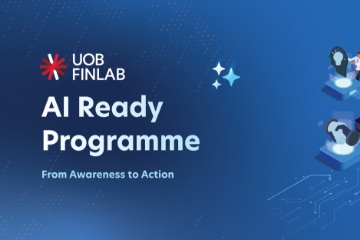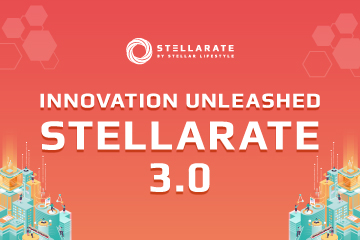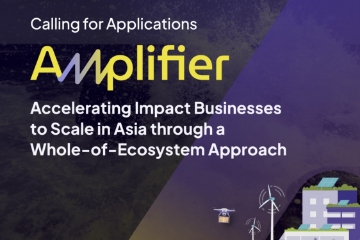You are now reading:
Budget 2022: Must-know updates for SMEs
1 of 3



Open a UOB eBusiness Account and perform 3 online FX transactions now.
From 1 Oct to 30 Nov 2025. T&Cs apply. Insured up to S$100k by SDIC.

Your go-to sustainability guide. Get your customised report today by taking the quiz now.
Take the quizyou are in GROUP WHOLESALE BANKING


You are now reading:
Budget 2022: Must-know updates for SMEs
Singapore's annual strategic financial plan in 2021 budget, had softened the consequences of Covid-19. 2022’s forward-looking and expansionary Budget will be focused on recovery, as we live amongst new variants and social distancing. According to Finance Minister Lawrence Wong, the recent Budget also realises Singapore’s “vision of a fairer, more sustainable, and more inclusive society."
In general, the Finance Minister presented a positive economic outlook, even though recovery is set to be rocky for some sectors. Announced key thrusts include:
This year, small-and-medium sized enterprises (SMEs) are put in the spotlight with these 5 areas of support from the government.
Covid-19 has wreaked havoc on economics around the world. SMEs, especially those in F&B, retail, tourism, and hospitality sectors, may still be struggling in some way. On top of Covid-19, electricity bill shocks have hit businesses, such as F&Bs with high electricity usage. Inflation concerns are also worrying SMEs as consumer sentiments may be impacted, affecting the recovery trajectory. SME owners may need critical help from the government as they face rising costs and cashflow difficulties.
In 2022’s Budget, the government unveiled changes to existing financing schemes and initiatives to help SMEs:
The Temporary Bridging Loan Programme (TBLP) has been extended for six months, from 1 April 2022 to 30 September 2022. This ensures SMEs continue to enjoy access to working capital since the omicron virus continues to pose threats to a more optimistic economic recovery.
Under the scheme, SMEs can gain easy access to working capital loans without the need to put up any collateral. The application process is simple and the bank will respond on loan application status within one business day. UOB Business Banking is one key partner SMEs can tap to unlock extra working capital of up to $1 million. Learn more about the UOB Business Loan, which combines Enterprise Singapore's (ESG) Temporary Bridging Loan and SME Working Capital Loan.
The Enhanced EFS – Trade Loan (EFS – TL) has been extended for six months, from 1 April 2022 to 30 September 2022. This helps Singapore-based businesses with trade financing needs, including short-term import, export, and guarantee needs, obtain additional working capital. Similarly, SMEs do not need to put up any collateral for the ESF-TL and they enjoy the flexibility to only pay interest on the amount of loan drawn.
While financial support is welcome in the near term, SME owners can think ahead to transform their business digitally and help employees adapt to the digital world. Over the next few years, S$200 million will be committed to these digitalisation schemes.
Advanced Digital Solutions
First announced in the Resilience Budget 2020, the Advanced Digital Solutions (ADS) scheme will help businesses adopt cutting-edge technologies. The ADS solution was launched in 2020 initially to help firms adopt advanced integrated solutions, such as robotics, the Internet of Things, and other technologies.
Now, SMEs will be happy to know solutions like artificial intelligence (AI) and cloud technologies that impact operational efficiency will be included. In addition, businesses will receive up to 70% funding support from 1 April 2022.
Grow Digital scheme
The Grow Digital scheme helps businesses access overseas markets digitally by leveraging Business-to-Business (B2B) and Business-to-Consumer (B2C) ecommerce platforms. Companies can receive 70% to onboard cross-border digital platforms from 1 April 2022.
For SMEs looking to digitalise immediately, the UOB's BizSmart programme is a straightforward way to begin digitalising business operations. The programme offers a suite of cloud-based solutions to SMEs, so any company can get support to manage everyday processes. SME owners can stay competitive, efficient and even improve their visibility by going digital.
As part of the $500 million jobs and business support package announced in Budget 2022, the government has also announced the Small Business Recovery Grant. This is a one-off cash payment for SMEs affected by the pandemic. The Inland Revenue Authority of Singapore (IRAS) will notify eligible firms from June 2022.
SME owners will see support for their employees in both hiring and upskilling. Workers who are the most vulnerable during the pandemic will benefit from the Jobs Growth Incentive.
Jobs Growth Incentive
The Jobs Growth Incentive (JGI), which helps the hiring of mature and vulnerable workers by providing salary support to eligible companies and employees, will be extended to September 2022.
According to IRAS, this extension from April 2022 will only cover workers aged 40 and above who have not been employed for over six months, persons with disabilities, and ex-offenders.
SkillsFuture Enterprise Credit
The SkillsFuture Enterprise Credit (SFEC) helps employers invest in their employees, creating a transformation-ready workforce.
According to Enterprise Singapore, eligible employers will receive a one-off $10,000 credit to cover up to 90% of out-of-pocket expenses on qualifying costs for supportable initiatives.
Now, more SMEs will be eligible due to the waiver of Skills Development Levy contribution requirement. Furthermore, there is no need to apply for SFEC, as the credit will be automatically applied to support programmes, and eligible employers will be informed in writing.
SMEs have been facing a challenging and competitive economic environment. As a result, SMEs need to make the most out of their operations and resources and help employees upskill to remain competitive. Overall, such moves will help SMEs become more productive and profitable.
Productivity and Solutions Grant
The Productivity and Solutions Grant (PSG) can be supported by the SFEC detailed above. The government will commit an additional $600 million over the next four years.
Under the grant, up to $40 million will go towards helping businesses apply for subsidised accounting and point-of-sale solutions. This will go a long way towards assisting companies in digitalising payments and adopting e-commerce. Such accounting or retail management software can help SMEs adapt quickly to new tax rules as well, which was announced in the Budget.
Research and development support
Along with upskilling and productivity support, Singapore also seeks to help SMEs with research and development (R&D) activities. The Finance Minister said that he would like to see local firms, especially SMEs, and the 80 centres of technology and innovation in polytechnics and the Institute of Technical Education be more collaborative.
Through increased capacity over the next five years, the R&D centres will embark on 2,000 innovation projects. In addition, five pilot sectors of agri-tech, construction, food manufacturing, precision engineering and retail were identified.
On top of these immediate support initiatives, climate-conscious SME owners will be pleased to know that Singapore’s long-term plans include going green.
Singapore plans to achieve net-zero emissions by or around 2050. Even though there is a carbon tax hike, the government will support companies, especially SMEs, to invest in “energy-efficient equipment and decarbonisation solutions”.
The Budget 2022 supports SMEs as they move towards a sustainable future while recovering from the after effects of COVID-19. Through suite of banking and beyond banking solutions, UOB will also continue supporting companies in the long-term as SMEs digitalise, upskill, and go green.
To find out how UOB can help your business grow or digitalise, visit
www.uob.com.sg/business
IMPORTANT NOTICE AND DISCLAIMER
The information contained on this website and/or in this article is strictly for informational purposes only and shall not be transmitted, disclosed, copied or relied upon by any person for whatever purpose and is based on certain assumptions and analysis of publicly available information and reflects prevailing conditions as of the date of the article. Any opinions, projections and other forward-looking statements regarding future events or performance of, including but not limited to, countries, markets or companies are not necessarily indicative of, and may differ from actual events or results.
The views expressed within this website and/or in this article are solely those of the author’s and are independent of the actual trading positions of United Overseas Bank Limited, its subsidiaries, affiliates, directors, officers and employees (“UOB Group”). Views expressed reflect the author’s judgment as at the date of this article and are subject to change.
UOB Group may have positions or other interests in, and may effect transactions in the securities/instruments mentioned on this website and/or in this article. The contents within this website and/or in this article is not an offer, recommendation, solicitation or advice to buy or sell any product or enter into any transaction and nothing herein constitutes accounting, legal, regulatory, tax, financial or other advice. Please consult your own professional advisors about the suitability of any transaction/ investment product/securities/ instruments for your investment objectives, financial situation and particular needs.
UOB Group may have also issued other reports, publications or documents expressing views which are different from those stated in this website and/or in this article. Although every reasonable care has been taken to ensure the accuracy, completeness and objectivity of the information contained in this this website and/or in this article, UOB Group makes no representation or warranty, whether express or implied, as to its accuracy, completeness and objectivity and accept no responsibility or liability relating to any losses or damages howsoever suffered by any person arising from any reliance on the views expressed or information in this website and/or in this article.
The contents in this website and/or in this article have not been reviewed by the Monetary Authority of Singapore.

27 Jun 2025 • 5 mins read

29 May 2025 • 5 mins read

29 May 2025 • 5 mins read

19 Jul 2024 • 3 mins read